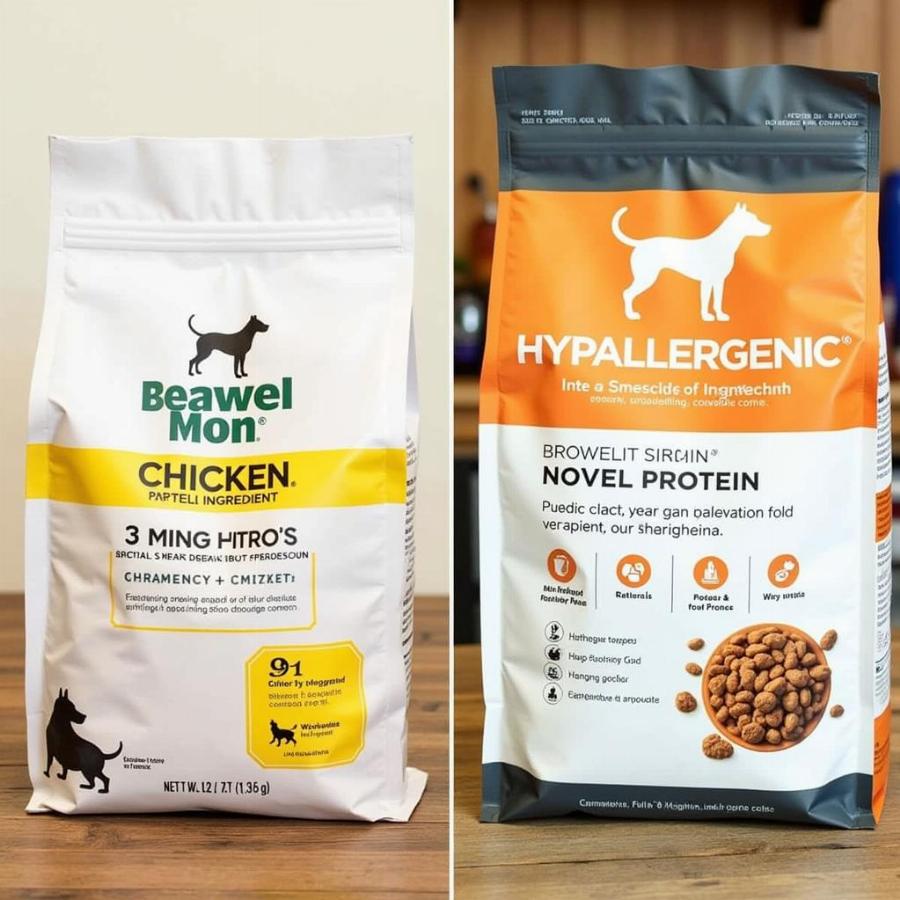Chicken is a common ingredient in many commercial dog foods. It’s a lean protein source and often touted as a healthy option. So, it can be surprising to learn that some dogs are actually allergic to chicken. This begs the question: are dogs allergic to chicken? The truth is, yes, they can be. While not as common as allergies to beef or dairy, chicken allergies in dogs are a real concern. This article will dive into the details of chicken allergies in dogs, helping you understand the symptoms, diagnosis, and management options.
What Does a Chicken Allergy in Dogs Look Like?
Unlike humans who often experience respiratory symptoms with allergies, dogs typically show skin-related signs. If your dog is allergic to chicken, you might notice:
- Itchy skin: This can be localized or all over the body.
- Excessive scratching, licking, or chewing: Often focused on the paws, ears, and belly.
- Skin infections: Secondary bacterial or yeast infections due to broken skin from scratching.
- Hair loss: Patchy or generalized hair loss can occur in affected areas.
- Ear infections: Chronic ear infections can be a strong indicator of food allergies.
- Gastrointestinal issues: Vomiting and diarrhea, though less common, can also be symptoms.
Sometimes, the symptoms can be subtle, making it difficult to pinpoint the cause. A thorough veterinary examination is essential for accurate diagnosis.
Diagnosing Chicken Allergies in Dogs
If you suspect your dog might be allergic to chicken, a visit to the vet is crucial. They will likely perform a physical examination and discuss your dog’s history. The gold standard for diagnosing food allergies is an elimination diet. This involves feeding your dog a novel protein diet – one containing a protein source they’ve never eaten before – for several weeks. Common novel proteins include venison, duck, kangaroo, or insect-based proteins. If the symptoms resolve on the new diet, a “food challenge” is then performed where chicken is reintroduced. If the symptoms return, it confirms a chicken allergy.
Managing a Chicken Allergy: What Can You Do?
Managing a chicken allergy primarily involves avoiding chicken in your dog’s diet. This means carefully reading ingredient labels on dog food and treats. Look for good food for dogs with allergies that are specifically formulated for allergies.
Choosing the Right Food
Selecting the right food is crucial. Look for foods that are “chicken-free” and ideally contain a novel protein. Hydrolyzed protein diets are another option. In these diets, the protein is broken down into smaller pieces, making it less likely to trigger an allergic reaction. Discuss these options with your veterinarian to determine the best choice for your dog. You can even explore options like soft dog food for small dogs with specific allergy considerations.
 Comparing Ingredients of Dog Food
Comparing Ingredients of Dog Food
Can Dogs Develop a Chicken Allergy Later in Life?
Yes, dogs can develop allergies at any age, even if they’ve eaten chicken without problems before. This can be confusing for owners. Just because your dog enjoyed chicken in the past doesn’t mean they won’t develop an allergy later on.
Dr. Emily Carter, a veterinary dermatologist, explains, “Food allergies are complex. A dog’s immune system can change over time, leading to the development of new allergies. This means even adult dogs can suddenly become allergic to foods they’ve previously tolerated.”
Are There Any Alternatives to Chicken for Dogs?
Absolutely! Many alternative protein sources exist, including fish, turkey, lamb, beef (if not also allergic), venison, and even insect-based proteins. Always consult your veterinarian before making significant dietary changes for your dog. They can guide you in choosing a nutritionally balanced and safe alternative. Understanding the prevalence of issues like dogs allergic to chicken can help you make informed choices for your furry friend.
Conclusion
Chicken allergies in dogs are a real concern, but with careful management, affected dogs can live happy and healthy lives. If you suspect your dog is allergic to chicken, don’t hesitate to contact your veterinarian. They can provide a proper diagnosis and guide you in choosing the best course of action, ensuring your furry friend remains comfortable and itch-free. Remember to always check ingredient labels and prioritize your dog’s health and well-being. Understanding if what percentage of dogs are allergic to chicken can help put your mind at ease.
FAQ
- Can chicken allergies be cured in dogs? No, food allergies are typically lifelong conditions. Management focuses on avoiding the allergen.
- What are the most common dog food allergens? Beef, dairy, wheat, and chicken are among the most common culprits.
- Are grain-free diets always good for dogs with allergies? Not necessarily. While some dogs benefit from grain-free diets, others may not. Focus on identifying the specific allergen.
- How long does it take for allergy symptoms to disappear after eliminating chicken? It can take several weeks to months for symptoms to fully resolve.
- Can I give my dog chicken broth if they are allergic to chicken? No, chicken broth still contains chicken protein and can trigger a reaction.
- Are there any over-the-counter medications for chicken allergies in dogs? While some over-the-counter antihistamines may provide temporary relief, it’s important to consult your veterinarian for appropriate treatment.
- Can allergic reaction in dogs ears be a sign of chicken allergy? Yes, ear infections and irritation can be a common symptom of a chicken allergy.
More Questions to Consider
- How do I transition my dog to a new food?
- What are the signs of a severe allergic reaction in dogs?
- Are there any home remedies for dog allergies?
Beaut Dogs is your go-to resource for all things related to show dogs, providing reliable, helpful, and in-depth information about the canine world. Visit our website at Beaut Dogs today! When you need assistance, contact us at Email: [email protected] for detailed and accurate answers from Beaut Dogs.